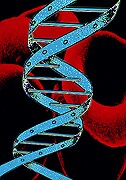
WEDNESDAY, Sept. 26 (HealthDay News) — A colorectal gene database will help further research into the disease, a new study suggests.
The CRCgene database gathers all genetic association studies on colorectal cancer. It allows researchers to accurately interpret the risk factors of the disease and provides insight into the direction of further research, according to Julian Little, with the department of epidemiology and community medicine at the University of Ottawa, and colleagues.
To determine the genetic factors associated with colorectal cancer, they analyzed data from all published genetic association studies on colorectal cancer.
The researchers identified 16 independent gene variants with the strongest links to colorectal cancer, among 23 variants, a number lower than expected. Unfortunately, the researchers say, this reduces the feasibility of combining variants as a profile in a prediction tool to identity people who are at increased risk for colorectal cancer and who should be screened for the disease.
Even so, the analysis “provides a resource for mining available data and puts into context the sample sizes required for the identification of true associations,” the researchers wrote in the Sept. 27 issue of the Journal of the National Cancer Institute.
About 950,000 new cases of colorectal cancer are diagnosed each year, according to a journal news release. Risk factors for the disease include age, diet, lifestyle and possibly genetics.
More information
The U.S. Centers for Disease Control and Prevention has more about colorectal cancer.

